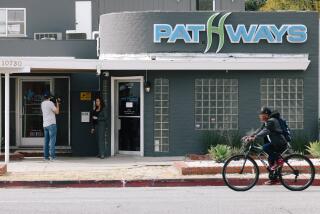Kevorkian’s Suicide Assistance Draws Notice Again
- Share via
PONTIAC, Mich. — Four times in eight days now, assisted-suicide crusader Jack Kevorkian has delivered corpses to Pontiac Osteopathic Hospital here.
The recent spate began with one of the most controversial of the 38 deaths he has presided over since 1990. Judith Curren, who committed suicide on Aug. 15, was a 40-year-old Boston-area nurse whose illness was nonfatal and who had been involved in domestic disputes with her husband.
And Thursday, in particular, was a long day for Kevorkian, who presided over two suicides and allegedly engaged in two scuffles with officers from two police departments.
The pace of suicides rivals the six deaths in 10 days that Kevorkian attended in 1993, shortly before Michigan’s now-expired ban on his activities went into effect. Suddenly, after a period in which Kevorkian’s work had subsided into routine, public officials and the press are paying attention again.
Kevorkian’s attorney, Geoffrey Fieger, says his client has not planned any speedup of suicides. “It’s just the course of events,” Fieger said.
Others suspect differently and willingly speculate on his motives.
“I think he’s orchestrating this by design to spur some activity in the Michigan Legislature,” said David Gorcyca, who recently defeated the incumbent Oakland County prosecutor in the Republican primary. Continued prosecution of Kevorkian, who has been acquitted twice here and once in neighboring Wayne County, was a major issue.
Both Gorcyca and the Democrat he will face in the fall have said they will not prosecute Kevorkian in the absence of clear state law on assisted suicide.
“And he may be trying to attract the attention of the [U.S.] Supreme Court,” Gorcyca added.
The American Medical Assn. announced Friday that it had filed a brief with the Supreme Court maintaining there is no constitutional right to assisted suicide. The court will decide by early fall whether to consider two recent appellate court rulings that may pave the way for legalizing help to people who want to kill themselves.
Kevorkian “has free rein now” since his third acquittal in May, said state Sen. Jim Berryman, whose bill to bring regulations for legal assisted suicide to a statewide vote remains stalled in committee.
Jurors asked for Kevorkian’s autograph after rendering their verdict. The retired pathologist helped a Canadian man commit suicide on the same day he testified in his own defense.
He presided over three more deaths in June.
On Thursday morning, Kevorkian took a court order to nearby Waterford Township that allowed him to pick up evidence from a 4-year-old case. A tank of carbon monoxide was missing and Kevorkian fought with law enforcement officers, township police said.
At noon, he brought the body of multiple sclerosis patient Patricia Smith, a 40-year-old nurse from Lee’s Summit, Mo., to the emergency room here.
Shortly after 9 p.m., he brought the body of Pat DiGangi, 66, a former New York history teacher, to the hospital. DiGangi also suffered from multiple sclerosis.
Both died of lethal injection, Oakland County Medical Examiner L.J. Dragovic said. Kevorkian invented a machine that allows patients to inject themselves with poisons with a push of a button.
When police tried to question him after he brought DiGangi’s body to the emergency room, the retired pathologist shouted epithets and shoved one officer, said Pontiac Sgt. Ken Lewis.
Kevorkian was arrested on suspicion of disorderly conduct and held for several hours at the police station before being released. Fieger apologized on Kevorkian’s behalf. “It should never have happened,” the attorney said.
*
Robert Aranosian, director of the osteopathic hospital, said Kevorkian has delivered the bodies of six suicides to his emergency room over the past year, including those of Curren and Louise Siebens, 76, who died Aug. 20. Siebens suffered from amyotrophic lateral sclerosis, also known as Lou Gehrig’s disease.
The staff, Aranosian said, has mixed feelings about Kevorkian. “There are a few who privately support him and some who don’t, and some are in between,” Aranosian said. “But I have instructed them all that when his patients arrive, we put our personal feelings aside.”
Kevorkian has said he does not accept fees for his efforts. He said at the National Press Club in Washington recently that he has paid his lawyer with a combination of foundation grants, bequests and individual donations.
More to Read
Sign up for Essential California
The most important California stories and recommendations in your inbox every morning.
You may occasionally receive promotional content from the Los Angeles Times.









